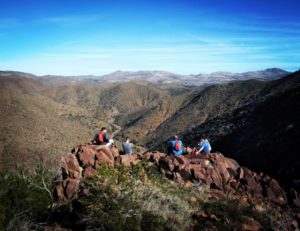Change occurs in small increments and relapse of old behaviors is common when attempting to achieve behavioral changes. 
The Transtheoretical Model, also known as the Stages of Change Model, was originally developed by Prochaska and DiClemente in the late 1970s in an attempt to understand why some smokers were able to successfully quit smoking on their own, while others required treatment in order to achieve their cessation goals. Although this model was developed to better understand addiction, it can also be applied to other changes that individuals attempt to pursue.
In the first stage, precontemplation, individuals do not intend to make any changes if they do not see their behaviors as problematic. They may overly focus on the negative aspects of making changes, as compared to focusing on the positive outcome of achieving change. For example, an individual considering making dietary changes may feel overwhelmed by the thought of meal prepping on the weekends to provide healthy meal options throughout the week, as it may appear too time consuming as compared to purchasing fast food.
In the second stage, contemplation, individuals develop an intention to engage in a healthy behavior within the next six months, as they recognize their behavior is problematic. Individuals take on a more thoughtful consideration of the benefits versus the consequences of not changing their behavior. For example, the individual may acknowledge that eating fast food for lunch on a daily basis has contributed to weight gain and an increase in his or her cholesterol level. Individuals may recognize that meal prepping on the weekend may actually save them time during the weekdays, as they will have ready-made lunch offerings for each day of the week. This will ultimately reduce travel time by eating on site versus seeking out fast food options, and the individual will achieve financial gain by bringing a lunch rather than purchasing it on a daily basis.
The third stage, preparation, involves individuals getting ready to take action within the next 30 days; individuals start taking necessary steps to achieve their identified behavior change. For example, the individual starts to develop healthy menu options and shopping lists to prepare the identified meals. He or she may also purchase reusable containers in order to bring lunch items to work with them.
The fourth stage, action, involves the individual making and intending to continue these positive changes. For example, the individual may go shopping on Saturdays to purchase the identified menu items, while utilizing Sunday for meal prep, resulting in healthy lunch options five days a week.
The fifth stage, maintenance, involves the individual sustaining this change for six months or longer; people in this stage work to prevent a relapse to earlier unhealthy behaviors. For example, the individual packs a lunch the evening before work each day, in order to prevent the need to seek out fast food.
In my work with addicts at Back2Basics, I continually focus on the Stages of Change process, as it is common for addicts to have attempted to quit many times prior to coming to treatment. Change occurs in small increments and relapse of old behaviors is common when attempting to achieve behavioral changes. Back2Basics promotes having a community of support to surround residents in creating sustainable changes in their lives, as we recognize that change should not occur alone. FBN
By Natalie Randolph, DBH, LMSW
Back2Basics is an Arizona state licensed and Joint Commission nationally accredited treatment center offering up to six months of daily programming. Back2Basics Outdoor Adventure Recovery combines residential therapeutic counseling with experiential outdoor adventures to treat individuals with substance and alcohol addiction and lead them through rehab and recovery into long-term sober living. The program is highlighted by spending time in the beautiful serene wilderness where individuals are physically challenged, their minds are cleared and they learn ways to defeat old addictive thinking patterns through various outdoor adventures. Now accepting insurance.





